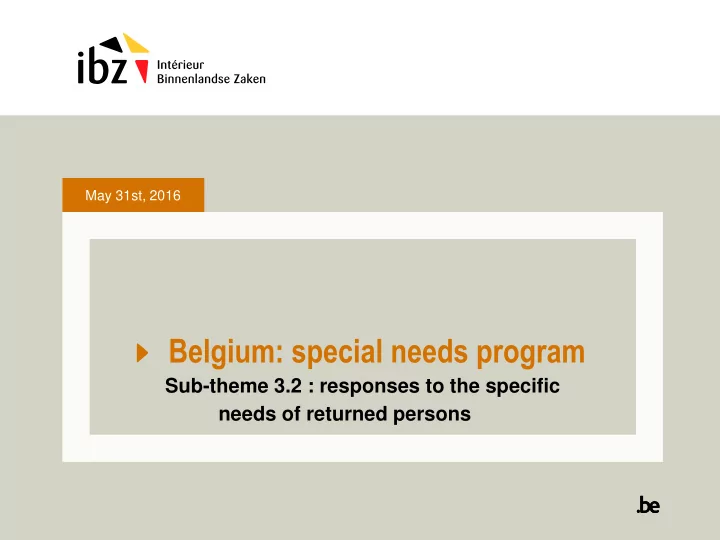

May 31st, 2016 Belgium: special needs program Sub-theme 3.2 : responses to the specific needs of returned persons
Focus Aim Offer support to vulnerable migrants before, during and after return to country of origin. This support is a transitional measure, in order to give the migrant the possibility to organize his long-term reintegration. Who ? Belgium: Immigration Office with local partners Duration ? Maximum 1 year, shorter if possible 2
Vulnerable migrants Who ? • Medical needs (physical or psychological) • Pregnant women • Seniors (> 65 years) • Migrants who need a specific follow-up for other reasons • Migrants who endanger the security and safety in the detention center, because of their medical problems 3
Which support ? 3 categories: Before return follow-up in the detention center 1. During return follow-up during flight 2. After return reintegration measures in country of 3. origin 4
follow-up in detention center • Admittance in psychiatric facility • Availability of medication in COI medcoi-database • Purchase of medication before return • Courses for staff members • Coordinating psychogists: liaisons between detention centers, prisons, … and central immigration office 5
Follow-up during flight Accompanied by : • medical specialist or nurse • Psychologist • Person of trust • Immigration liaison officer 6
Reintegration measures in country of origin • Reintegration support for maximum 1 year with a maximum budget • Medical follow-up (psychiatry, medication, doctor’s appointment , …) • Administrative support • Practical support (temporary shelter, food, …) • NO economical support, NO cash money depending on the possibilities in the country of origin 7
Example 1: DRC – psychiatric problems 30-year old man with combination of psychiatric problems (depression, autism, mental issues, schizo- affective problems), family not traceable, cannot take care of himself Identification DRC 1. Medication available in DRC ? 2. Psychiatric follow-up contract with psychiatric 3. institution near Kinshasa 4. Medical follow-up during flight Accompanied to institution medical follow-up 5. Family traced sister takes care of him 6. 8
Example 2: Tunisia – kidney dialysis 28-year old man, kidney transplant in 2007, kidney failure, needs 3 times/week kidney dialysis, no social insurance, not voluntary to return Identification Tunisia 1. 2. Contacting doctors/hospitals in Tunis 3. social security (CNAM) Fixing price for 10 times dialysis (3 offers) prise 4. en charge with guarantee dialysis after return Arrest medical follow-up in detention center 5. 6. Medical follow-up during flight (doctor) 7. Dialysis took place 9
statistics 2015 2016 Total number of requests 70 46 Admittance in psychiatry before return 3 4 Purchase of medication 31 4 Follow-up during return 10 2 Reintegration after return 46 6 10
conclusion • Humane return of vulnerable migrants is a basic obligation of every country • Search for ad hoc solutions: time-consuming, costs but long-term perspective • project does not replace the system of residence permits on the basis of medical reasons • Project wants to keep voluntary return still more attractive 11
Questions ? Projectmanager Isabelle VERVLOESEM T: +32 2 793 8212 F: +32 2 274 66 94 M: isabelle.vervloesem@ibz.fgov.be Project worker Stéphanie GOOS T: +32 2 793 82 23 F: +32 2 274 66 94 M: stephanie.goos@ibz.fgov.be Project psychologists Mailys DEREYMAEKER & Isabelle DE ROOCK T: +32 793 85 09 / +32 793 85 06 E: psychologen.centra-fitt@ibz.fgov.be 12
13 23 januari 2009
Recommend
More recommend